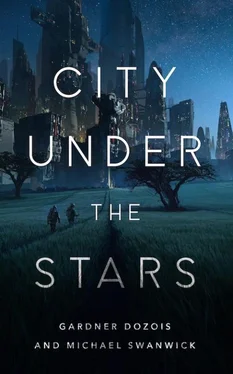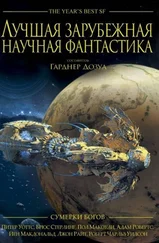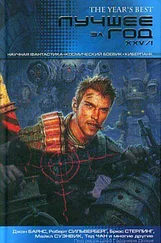* * *
Silence.
He was in a room full of shadows and jumbled shapes. Something shifted slightly to one side. There were other furtive movements to the other side, up ahead, just behind. With a start, Hanson realized that he was not alone. The room was filled with prowling animals, great cats the size of cougars. There was painfully little light, but they had, he thought, human faces, and they spoke with the voices of women.
“Oh, baby,” one murmured, “let me rip you open.”
“My fangs are long,” said another.
“My claws are sharp.”
“My breasts are heavy with milk.”
They prowled one over the other, haunches high in the darkness, too many, the light too dim, for Hanson to determine their number. Their eyes and teeth flashed in the gloom. They were in constant motion, slinking, stalking.
“See my long pink tongue.”
“Smell my hindquarters.”
“Imagine my teeth piercing your lips, tearing the flesh off of your face.”
“I’ll make sure you suffer a long, long time.”
“Oh, honey.”
Their voices overlapped in a kind of moaning chorus. Their eyes materialized and disappeared behind flirtatious lashes.
“Poor baby. It’s been so long since you experienced anything with intensity.”
“ We’ll make you feel something.”
“I’ll pull out your intestines an inch at a time—slowly, slowly.”
It was terrifying. It was too much. Hanson found himself pulling in upon himself, wrapping arms about his body, shivering. It wasn’t fair! He didn’t know any of the rules here, any of the assumptions. Cicero , he thought. If only Cicero were here, he’d know what to do.
“It’s all right,” Cicero said. “I’m here.” He strode through the cat-women as if either he or they were not entirely real, completely ignored by them all. “If you’ll look down, you’ll see a set of parallel lines glowing faintly on the floor. They mark a safe passage from the one plate to the other. So long as you stay between them, you’re perfectly safe.”
He took Hanson’s arm, led him across the room.
Wobbly, Hanson allowed himself to be led. “How did you find me?” he asked. “How did you know I—?” He stopped, unable to finish the sentence.
“I am a function.”
“Oh.” The cat-women paced him, musky-smelling and avid-faced. Growling their lust. Ignoring them as best he could, Hanson asked, “Why? Why would anybody want—” He swept out an arm to encompass them all. “— this ?”
“You have been a long time away indeed,” Cicero said, “to have forgotten the need for such entertainments.”
They stepped on the plate—
—a grove of slim buildings so tall that the rivers of water falling from their fluted tops dissolved into rainbows and mist long before they could reach the ground.
—a stone cathedral floating within a sad brown sunset, which stared at him with a hundred human eyes.
—a twilight plane where armies of metal giants fought with axes and clubs, while small and tireless servitor machines retrieved the scrap and climbed their sides to rebuild the damaged parts.
—a small room smelling of chickens and new-mown hay, where blue flames flickered over revolving bowls of mercury.
—a tangle of snakes that raised agonized heads as large as houses against a steel-plate sky.
—an incandescent mushroom cloud, strangely still and unchanging, like a snapshot of some catastrophic explosion, a frozen instant of horrified time.
The light and heat from this last were excruciating. Hanson threw a hand over his watering eyes, his stinging face, and cried, “Where are we going?”
“Why, wherever you want,” Cicero said. “We have been traveling at random, while I awaited your directions.”
“Then take me home.”
Cicero smiled encouragingly. “And where is that?”
It was as if one of the cat-women had arisen out of nowhere to present him with a riddle encompassing the purpose and end of human life. Hanson’s mind was blank; for a long moment he could think of no possible destination to offer in response. Then, “Boone,” he said finally. “Take me back to Boone.”
* * *
There was a light dusting of yellow pollen on the balcony, and a springlike coolness to the air. Cicero gestured Hanson through a doorway and into an unfamiliar room. The walls were lined with dark wood paneling and shelves of leather-bound books. Squares and scrolls hung unsupported in the air, a dozen or more, some bright with moving images, others filled with cryptic text. Boone looked up from a writing desk, and, with a wild cry, stood. Papers scattered from him like birds. He ran through the squares and scrolls as if they did not exist, and hugged Hanson with all his strength.
“Aw, now,” Hanson muttered in confusion. “C’mon, now.” Embarrassed, he patted the man’s back once, twice, feather-light and reluctant touches.
Boone stepped back, smiling through his tears. “Where the hell have you been ? I stayed here, made this my camp, hoping against hope that you’d—well, that hardly matters. You’re back now, that’s all that matters. Only—where have you been? ”
“I was—” Hanson spread his hands and looked down into them helplessly as if they might contain an answer that was nowhere else to be found. He did not know where he had been. “I think I found some post-Utopians.” Boone started and shot him an odd look. “They were… strange. Like cats.”
“Those were not citizens,” Cicero corrected gently. “They were a function. Like me.”
“Oh, shut up.” Boone wiped away his tears and put his hands on his hips. He glared up at Hanson, who, abruptly and with an odd sense of dislocation, realized that he had somehow acquired a mustache and a trim little goatee. “I suppose you think that was funny? I suppose you think you can just follow whatever damn-fool notion enters your head? Well, I have news for you . From this moment on, you’re not going anywhere without my express permission. You got that? I don’t want you going to the shithouse to jerk off without telling me first.”
Hanson flushed. His muscles bunched and knotted under the lash of Boone’s words. He felt that all-too-familiar burning sensation at the back of his throat, the bitter fire of resentment forcibly suppressed. He could crush the little man in his bare hands, if he wanted to, and you’d think that Boone would by God respect that, would at least grant him the elementary caution one gave a manshogger or factory machine with a known history of mangling its operators. It griped him that he did not.
But he needed Boone, and they both knew it. The City of God was comprehensible to Boone in ways it was not to Hanson; he needed the little man’s direction and guidance. Ducking his head, he felt the old habits of submission, of obedience, of silence, the reflexive knuckling under to the loudest voice, come over him like an old, heavy, and detested coat. “It was only a little while.”
“A little while! Eight months you were gone, and you call it—” Boone’s voice rose sarcastically “—a little while?”
Hanson lifted his hands, palms up, baffled. “Eight months? But—” Boone silenced him with a look. And though he was trying to hide it, there was less anger than fear in that look: fear and loneliness. Eight months Boone had spent by himself, without human company, enduring an isolation that would be a burden for even the strongest man, and would break or even kill the weak; the gods alone knew what he’d been through, or how he had withstood it.
For long minutes, Boone simply stared at him, as if afraid he was about to turn away and stalk off once more. Then, stooping, he began to gather up his papers. “These are my notes,” he said. “Oh, nothing formal, you understand. Just jottings, really. I spent the winter researching the City’s records. If you want to call them that. There’s enough information available here to drown in, but none of it’s organized at all usefully, nothing is presented in any kind of—well, never mind.” He passed a hand over his eyes, wiping them clean of tears.
Читать дальше












